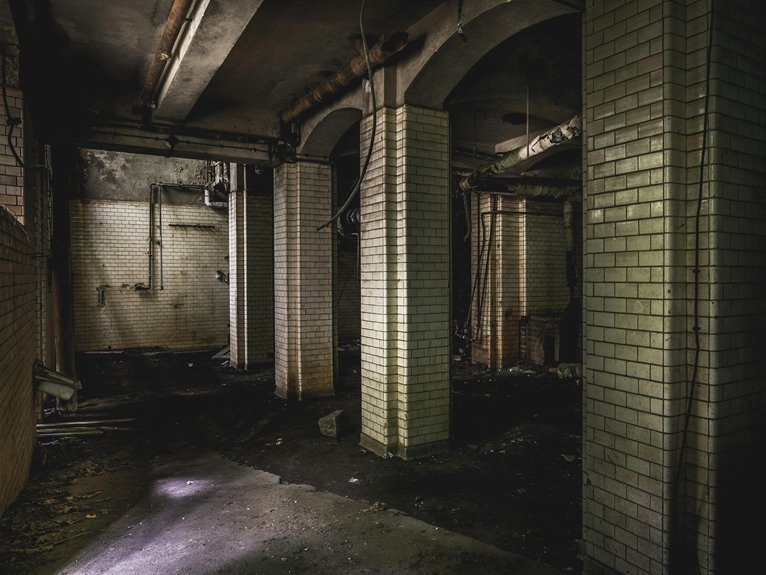When considering basement waterproofing in Kitchener, it’s essential to understand the varying costs involved. Your expenses can range from $2,000 to $10,000, depending on factors like water damage severity and the waterproofing methods you choose. Each method has its own price tag, with exterior excavation typically being more expensive. Knowing what influences these costs can help you make informed decisions, but there’s much more to explore regarding the best practices and options available.
Key Takeaways
- Basement waterproofing costs in Kitchener typically range from $2,000 to $10,000, depending on the extent of water damage and chosen methods.
- Exterior excavation methods are generally more expensive than interior sealants, affecting overall pricing.
- Additional costs may include permit fees, quality of materials, and professional labor charges.
- DIY waterproofing can reduce upfront costs but may lead to future expenses from potential mistakes.
- Consulting local professionals can provide tailored estimates and insights on specific needs in Kitchener.
Understanding Basement Waterproofing
When you think about basement waterproofing, it’s essential to understand that this process involves preventing water from entering your basement, which can lead to structural damage and mold growth.
Managing basement moisture is vital; excessive dampness can compromise your home’s integrity. By implementing effective waterproofing techniques, you can experience significant waterproofing benefits, such as increased property value, enhanced air quality, and a healthier living environment.
Methods like exterior drainage systems, interior sealants, and sump pumps can effectively reduce water intrusion. Addressing these issues proactively not only safeguards your home but also contributes to long-term peace of mind.
Factors Influencing Waterproofing Costs
Several key factors influence the costs of basement waterproofing, each contributing to the overall expense you might incur. These elements include the extent of water damage, the type of materials used, and the installation timing, which can affect labor costs. Additionally, a cost comparison between DIY and professional services can considerably impact your budget.
| Factor | Impact on Cost |
|---|---|
| Extent of Damage | Higher repair costs |
| Material Quality | Varies widely |
| Labor Type | DIY vs. Professional |
| Installation Timing | Seasonal price changes |
Types of Waterproofing Methods
When it comes to waterproofing your basement, you’ll encounter various methods tailored to different needs.
Interior waterproofing solutions focus on sealing and managing moisture within the space, while exterior waterproofing techniques address water intrusion from outside.
Additionally, drainage system options play a critical role in directing water away from your foundation, ensuring long-term protection.
Interior Waterproofing Solutions
Interior waterproofing solutions are essential for preventing moisture intrusion and damage in basements. By effectively managing interior humidity, you can greatly reduce the risk of water damage. Here are some common methods:
| Method | Description | Pros |
|---|---|---|
| Interior Sealants | Coatings applied to walls and floors | Simple application |
| Sump Pumps | Pumps that remove water accumulation | Effective for high water |
| Drainage Systems | Internal drains directing water away | Reduces flooding risk |
| Dehumidifiers | Devices that lower humidity levels | Improves air quality |
| Vapor Barriers | Sheets that block moisture ingress | Cost-effective solution |
Exterior Waterproofing Techniques
Exterior waterproofing techniques are essential for protecting your basement from water intrusion and structural damage.
By implementing these methods, you can effectively manage moisture levels and enhance your home’s longevity:
- Exterior drainage systems to redirect water away from your foundation.
- Landscape grading that slopes away from your home, preventing water accumulation.
- Waterproof membranes applied to your foundation walls, providing a protective barrier.
These solutions not only safeguard your basement but also improve your property’s overall health.
Drainage System Options
While various waterproofing methods exist, selecting the right drainage system is crucial for effective basement protection.
You’ll find several drainage system types, including interior and exterior systems. Interior systems involve sump pumps and perforated drains, collecting and redirecting water from within.
Exterior systems typically consist of French drains and weeping tiles, installed around your foundation to divert water away.
Proper drainage system installation guarantees efficient water management, preventing moisture buildup and potential structural damage.
Assess your specific needs and consult with professionals to determine which option best suits your basement, guaranteeing long-lasting protection against water intrusion.
Average Cost Estimates for Kitchener
When considering basement waterproofing in Kitchener, it’s essential to understand the factors influencing costs, such as the extent of water damage and the chosen waterproofing method.
Typically, you can expect price ranges that vary based on these elements, with some projects costing as little as $2,000 and others exceeding $10,000.
Knowing these estimates helps you budget effectively and make informed decisions.
Factors Influencing Costs
Understanding the costs of basement waterproofing in Kitchener involves considering several key factors that can greatly impact your overall expenditure.
- Extent of water damage: The more severe the damage, the higher the costs for repairs and waterproofing.
- Basement humidity levels: High humidity may necessitate additional dehumidification systems, increasing your budget.
- Type of waterproofing method: Interior vs. exterior systems can vary considerably in price and effectiveness.
Typical Price Ranges
Basement waterproofing costs in Kitchener typically range from $2,000 to $10,000, depending on various factors such as the severity of water damage and the chosen waterproofing method.
For instance, exterior excavation methods are often pricier than interior sealants. You should also consider that basement moisture levels can indicate underlying issues, which may drive costs up.
Beware of waterproofing myths; not all products guarantee complete protection or longevity.
It’s crucial to consult professionals who can provide accurate estimates tailored to your specific situation, ensuring you invest wisely in protecting your home from potential water damage.
Cost Breakdown by Method
While various methods exist for waterproofing, each comes with its own cost implications that can greatly affect your decision-making process.
Understanding the cost comparison between these methods is essential for evaluating their effectiveness.
- Interior Sealants: Typically less expensive, but may require frequent application.
- Exterior Excavation: Higher upfront costs, but offers long-term protection and durability.
- Drainage Systems: Moderate costs with effective moisture control, ensuring method effectiveness.
Additional Costs to Consider
When planning your basement waterproofing project, you’ll need to factor in additional costs that can greatly impact your budget.
Permit fees and regulations may be required by your local municipality, while the quality of materials you choose can affect both durability and price.
Additionally, hiring professional labor can vary in cost depending on the expertise and availability of contractors in your area.
Permit Fees and Regulations
Maneuvering the complexities of permit fees and regulations is essential before commencing any basement waterproofing project, as local laws often dictate necessary approvals.
You’ll need to familiarize yourself with permit requirements and zoning regulations specific to Kitchener.
- Application fees can vary considerably based on project scope.
- Inspection costs may arise, ensuring compliance with building codes.
- Timeline delays can occur if permits aren’t processed promptly.
Material Quality Differences
After securing necessary permits, the next essential factor in basement waterproofing involves understanding the differences in material quality, which can greatly impact overall costs.
Higher-quality materials often offer better material durability, resisting moisture and preventing future issues. However, this enhanced durability comes with price variations that can markedly affect your budget.
For instance, investing in premium waterproofing membranes or advanced drainage systems may seem costly upfront but can save you money on repairs down the line.
Weighing the long-term benefits against initial expenses is vital for making an informed decision that balances quality and affordability in your project.
Professional Labor Costs
While choosing high-quality materials is essential, you can’t overlook the impact of professional labor costs on your basement waterproofing project. Labor rates can vary considerably based on the contractor’s experience, which influences the overall price.
A skilled contractor not only guarantees proper installation but also reduces future issues.
- Expertise in waterproofing techniques
- Efficient project timelines
- Reliable warranty coverage
Investing in experienced labor may seem costly upfront, but it often leads to long-term savings and peace of mind.
Make certain to balance material costs with professional labor to achieve the best results for your basement waterproofing needs.
DIY vs. Professional Waterproofing
When considering basement waterproofing, you’ll face a choice between tackling the project yourself or hiring a professional.
DIY advantages include lower costs and the ability to learn valuable skills. However, consider the time investment; waterproofing properly can take significant effort and may not yield the best results without experience.
On the other hand, professional expertise guarantees that the job is done right, often providing warranties and peace of mind.
Cost comparisons between DIY and professional services reflect potential savings against the risk of future issues.
Ultimately, weigh your skills, time, and budget before making a decision.
Long-Term Savings From Waterproofing
Investing in basement waterproofing can lead to significant long-term savings that often outweigh the initial costs.
Investing in basement waterproofing offers lasting savings that often surpass the initial expenses.
By preventing moisture issues, you’ll enhance your home’s energy efficiency and ultimately increase your property’s value.
Consider these benefits:
- Lower energy bills due to improved insulation and reduced humidity.
- Increased lifespan of your foundation and structural components.
- Higher resale value, attracting potential buyers looking for a well-maintained property.
These long-term advantages not only protect your investment but also provide peace of mind, knowing that your home is secure against water damage and its associated costs.
Choosing the Right Contractor
Selecting the right contractor for basement waterproofing is essential to ensuring the job is done effectively and lasts for years.
Start by evaluating contractor qualifications, including licenses, insurance, and experience in waterproofing projects. A well-qualified contractor will provide a detailed plan and timeline for your project.
Don’t forget to check customer reviews; they offer valuable insights into the contractor’s reliability and quality of work. Look for consistent positive feedback and be cautious of red flags.
Financing Options for Basement Waterproofing
How can you manage the costs of basement waterproofing without breaking the bank?
Exploring financing options and payment plans can ease the financial burden. Here are some solutions to contemplate:
- Home equity loans: Tap into your property’s value for necessary funds.
- Personal loans: Secure a loan with a fixed interest rate for predictable payments.
- Contractor financing: Some companies offer tailored payment plans, allowing you to pay over time.
Conclusion
In summary, investing in basement waterproofing in Kitchener is essential for protecting your property from water damage. By understanding the various factors influencing costs and comparing different methods, you can make informed decisions. Whether you opt for DIY solutions or hire professionals, guarantee you choose a reliable contractor to achieve long-lasting results. Don’t forget to explore financing options to manage your budget effectively, ultimately safeguarding your home and enhancing its value.

